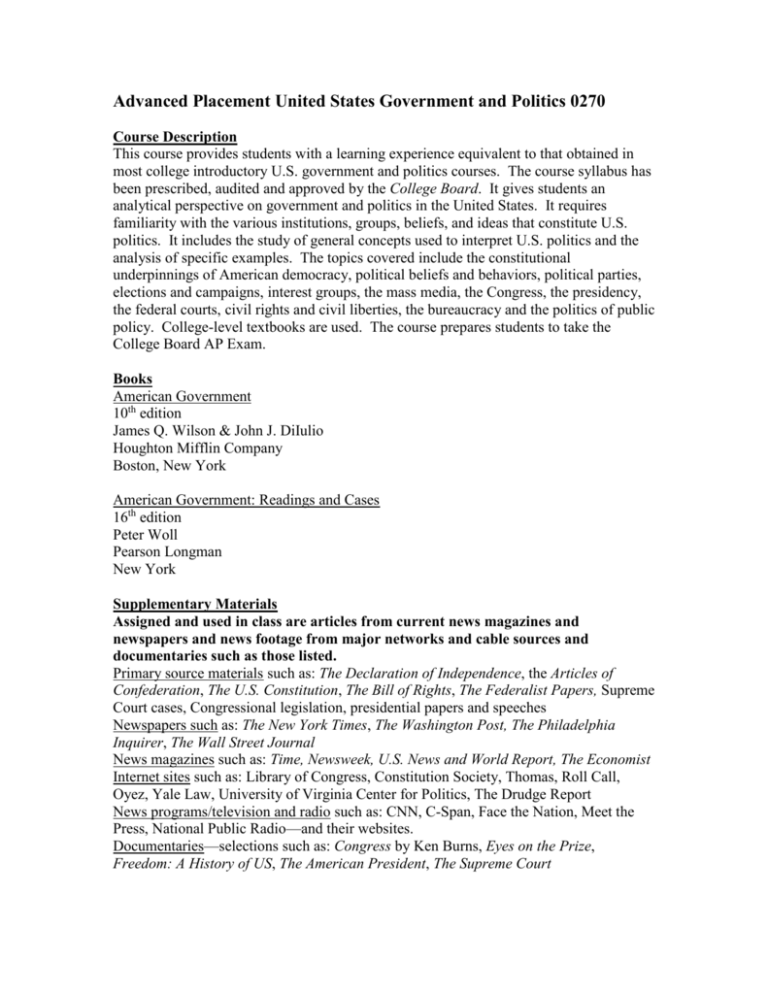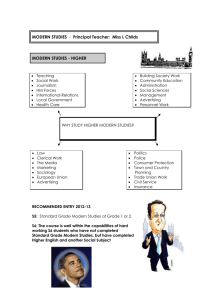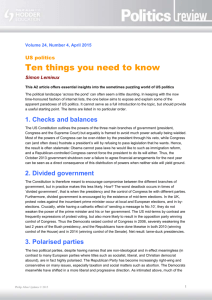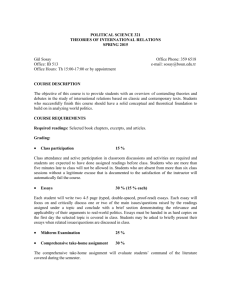
Advanced Placement United States Government and Politics 0270
Course Description
This course provides students with a learning experience equivalent to that obtained in
most college introductory U.S. government and politics courses. The course syllabus has
been prescribed, audited and approved by the College Board. It gives students an
analytical perspective on government and politics in the United States. It requires
familiarity with the various institutions, groups, beliefs, and ideas that constitute U.S.
politics. It includes the study of general concepts used to interpret U.S. politics and the
analysis of specific examples. The topics covered include the constitutional
underpinnings of American democracy, political beliefs and behaviors, political parties,
elections and campaigns, interest groups, the mass media, the Congress, the presidency,
the federal courts, civil rights and civil liberties, the bureaucracy and the politics of public
policy. College-level textbooks are used. The course prepares students to take the
College Board AP Exam.
Books
American Government
10th edition
James Q. Wilson & John J. DiIulio
Houghton Mifflin Company
Boston, New York
American Government: Readings and Cases
16th edition
Peter Woll
Pearson Longman
New York
Supplementary Materials
Assigned and used in class are articles from current news magazines and
newspapers and news footage from major networks and cable sources and
documentaries such as those listed.
Primary source materials such as: The Declaration of Independence, the Articles of
Confederation, The U.S. Constitution, The Bill of Rights, The Federalist Papers, Supreme
Court cases, Congressional legislation, presidential papers and speeches
Newspapers such as: The New York Times, The Washington Post, The Philadelphia
Inquirer, The Wall Street Journal
News magazines such as: Time, Newsweek, U.S. News and World Report, The Economist
Internet sites such as: Library of Congress, Constitution Society, Thomas, Roll Call,
Oyez, Yale Law, University of Virginia Center for Politics, The Drudge Report
News programs/television and radio such as: CNN, C-Span, Face the Nation, Meet the
Press, National Public Radio—and their websites.
Documentaries—selections such as: Congress by Ken Burns, Eyes on the Prize,
Freedom: A History of US, The American President, The Supreme Court
Teacher Prepared Materials
Outline notes, power points, charts, graphs, cartoons, maps, data, book discussion
questions, worksheets, review sheets to reinforce content material
Student Responsibilities
Students are responsible for keeping up with weekly assignments. In addition, in order to
be able to relate class material to the events of the day, students are required to remain
current regarding the events of the nation on a regular basis. This can be accomplished
by listening to NPR, watching the national nightly news or any of the many news stations
such as CNN, skimming the front pages of The New York Times, The Washington Post,
The Philadelphia Inquirer, or going online to one of the many reliable sources such as the
Drudge Report every day.
Course Organization
The course is broken into four major units. Each unit will include textbook reading,
primary source reading and analysis, secondary reading and recent scholarship on the unit
content with discussion questions.
Evaluation and Expectations
Chapter tests will be given for each chapter. Quizzes and FRQ (free response) essays
will be given as appropriate. Tests will consist of multiple choice questions and free
response essay questions. As much as possible, the essays and exam questions are
selected from prior year AP United States Government and Politics Exams.
Practice exams will be given at the end of the course in preparation for the AP exam.
Grading Policy
The grade is based on a point system. Points will be given for tests, quizzes, essays, in
class assignments, and class participation.
Late Work
The student handbook policy regarding late work is in effect. You have three days to
make up work for an excused absence. No credit will be given for any work, including
tests and in class essays, for any unexcused absences. It is your responsibility to initiate
all make-up work. Please see my web page on a regular basis for work.
Attendance
Attendance in class is vital. Class participation will be 10% of your grade for each
marking period. Attending each class, arriving on time, and active participation are the
primary considerations for this portion of your grade
Course Outline
Unit I: The American System
Chapter 1: The Study of American Government
Chapter 2: The Constitution
Chapter 3: Federalism
Chapter 4: American Political Culture
Chapter 5: Civil Liberties
Chapter 6: Civil Rights
Unit II: Opinions, Interests, and Organizations
Chapter 7: Public Opinion
Chapter 8: Political Participation
Chapter 9: Political Parties
Chapter 10: Elections and Campaigns
Chapter 11: Interest Groups
Chapter 12: The Media
Unit III: Institutions of Government
Chapter 13: Congress
Chapter 14: The Presidency
Chapter 15: The Bureaucracy
Chapter 16: The Judiciary
Unit IV: The Politics of Public Policy
Chapter 17: The Policy-Making Process
Chapter 18: Economic Policy
Chapter 19: Social Welfare
Chapter 20: Foreign and Military Policy
Chapter 21: Environmental Policy
Chapter 22: Who Governs? To What Ends?
Supplies Needed
1. Wide loose-leaf binder to be kept at home: This will serve as your primary
review book for the A.P. Exam as well as the midterm and final. As each unit
is completed you should carefully file the materials into this binder.
2. Loose-leaf binder 1-1½ to be used each day: You will use this notebook to
outline your readings, for class notes, handouts, primary source materials, and
all other material for the unit currently being studied. Following each unit
exam, this material should be put in your larger binder at home.
3. Loose-leaf paper












